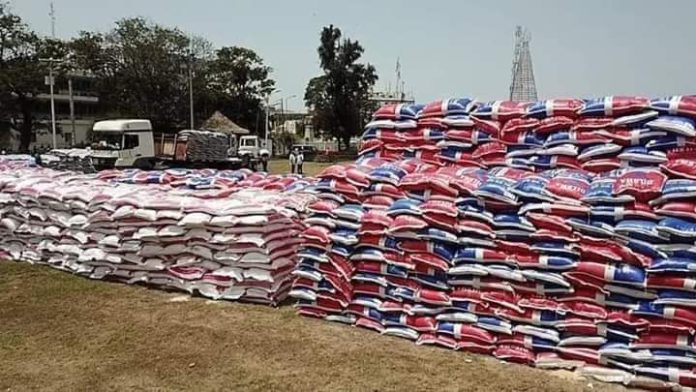By Kemeseng Sanneh (Kexx)
Modou Gaye, a serving member of the Gambia police force under the Fraud Squad Monday testified in the economic crimes and theft trial involving businessman, Alhagie Kebbeh.
Gaye is a resident of Jabang. Officer Modou Sarr testified that he recognised the accused person during an investigation he participated in regarding the alleged misappropriation of COVID-19 relief funds for supply of rice and oil, which were paid for by the government.
He explained that following the investigation, the accused person was arrested and questioned about the allegations. He explained the process of obtaining a statement from the businessman. He testified that the accused person wrote his statement in the presence of an independent witness. He said the accused person and the independent witness signed the statement, and he endorsed it. The witness added that no independent witness was present in some moments of the statement-taking process.
When asked who recorded the statement without an independent witness, Officer Sarr clarified that the accused person personally recorded the statement, and a voluntary statement was also obtained from him.
The Director of Public Prosecution A.M. Yusuf handed the witness the voluntary statements and two cautionary statements for verification. The witness confirmed that the statements were the statements obtained from the accused person. The statements were admitted in evidence and marked as exhibit P2 (cautionary statement), P3 (cautionary statement), and P4 (voluntary statement). There was no objection by Defence Counsel, Lamin S. Camara.
Under cross-examination by Senior Lawyer Lamin S. Camara, the witness said the complainant in this case was the Ministry of Agriculture.
“Is it correct that the complaint was in respect of the procurement of rice to alleviate the impact of COVID-19?” Counsel Camara asked
“That’s correct,” the witness answered.
“Is it correct that the Ministry of Agriculture entered into a contract with 39 vendors in respect of the procurement of the rice?” Counsel Camara asked.
“That is right,” the witness answered.
“And this Sixty-Four Million Eighty Thousand Dalasi was an amount paid to the vendors directly by the Ministry of Agriculture?” Counsel Camara asked.
“That is correct,” the witness answered
“It was these 39 vendors who had a direct connection with the accused,”? Counsel Camara asked.
“That is correct,” the witness answered.
“Am I correct to say that there is no contract on the procurement between the Ministry of Agriculture and the accused person,”? Counsel Camara asked.
“I beg to defer. There was no direct contract between the Ministry of Agriculture and the accused person, but the funds that were paid to the 39 vendors were from the government’s coffers,” the witness answered.
“Between the 39 vendors and the accused, who has the contractual obligation with the Ministry?” Counsel Camara asked.
“The accused person has the obligation on the basis that as per the mode of the procurement contract, the government paid to the vendors who would subsequently pay to the accused person. The accused person was supposed to deliver the rice to the government and WFP,” the witness answered.
“Do you know the names of the 39 vendors,” Counsel Camara asked
“I may not remember all their names, but all of them were identified during the investigation,” the witness answered.
“Did you confirm whether the Ministry of Agriculture paid monies to them according to their respective procurement contracts?” Counsel Camara asked.
“Yes, I confirmed” the witness answered.
“Why were the 39 vendors not arrested for not complying with the terms of the procurement contract?” Counsel Camara asked.
“The vendors fulfilled their contractual obligation, which was to purchase the rice from the accused person who stored it in his warehouse and was supposed to deliver it whenever the government needed it to be delivered to the needy Gambians. This rice was confirmed to be stocked in the accused person’s warehouse,” the witness said.
He explained that the accused person said he sold the rice due to storage issues.
Counsel Camara gave the exhibits to the witness to show the court to back up his claim. The witness added he got the information from the office of the accused person.
“Do you know Win-Win Oil Gambia Limited company,”? Counsel Camara asked.
“Yes,” the witness answered.
“Do you know it is a private company?” Counsel Camara asked.
“Yes,” the witness answered.
“You also know that the 39 vendors were dealing with that company subsequently?” Counsel Camara asked.
“Yes,” the witness answered.
“And you know that the company has a board,”? Counsel Camara answered.
“There was no existing board,” the witness answered.
“The company has shareholders,”? Counsel Camara asked
“Yes,” the witness answered.
“The accused person was the Managing Director of the company,”? Counsel Camara asked
“Correct,” the witness answered.
The case was adjourned to the 8th of July at 12:30 pm for the continuation of hearing.
















